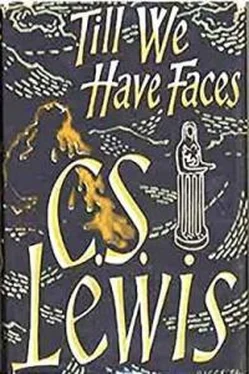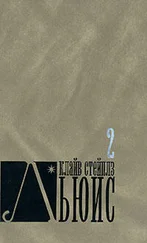My real strength lay in two things. The first was that I had, and especially for the first years, two very good counsellors. You couldn’t have had better yokefellows, for the Fox understood what Bardia did not, and neither cared a straw for his own dignity or advancement when my needs were in question. And I came to understand (what my girl’s ignorance had once hidden from me) that their girding and mocking at one another was little more than a sort of game. They were no flatterers either. In this way I had some profit of my ugliness; they did not think of me as a woman. If they had, it is impossible that we three, alone, by the hearth in the Pillar Room (as we were often) should have talked with such freedom. I learned from them a thousand things about men.
My second strength lay in my veil. I could never have believed, till I had proof of it, what it would do for me. From the very first (it began that night in the garden with Trunia) as soon as my face was invisible, people began to discover all manner of beauties in my voice. At first it was “deep as a man’s, but nothing in the world less mannish”; later, and until it grew cracked with age, it was the voice of a spirit, a Siren, Orpheus, what you will. And as years passed and there were fewer in the city (and none beyond it) who remembered my face, the wildest stories got about as to what that veil hid. No one believed it was anything so common as the face of an ugly woman. Some said (nearly all the younger women said) that it was frightful beyond endurance; a pig’s, bear’s, cat’s, or elephant’s face. The best story was that I had no face at all; if you stripped off my veil you’d find emptiness. But another sort (there were more of the men among these) said that I wore a veil because I was of a beauty so dazzling that if I let it be seen all men in the world would run mad; or else that Ungit was jealous of my beauty and had promised to blast me if I went bareface. The upshot of all this nonsense was that I became something very mysterious and awful. I have seen ambassadors, who were brave men in battle, turn white like scared children in my Pillar Room when I turned and looked at them (and they couldn’t see whether I was looking or not) and was silent. I have made the most seasoned liars turn red and blurt out the truth with the same weapon.
The first thing I did was to shift my own quarters over to the north side of the palace, in order to be out of that sound the chains made in the well. For though, by daylight, I knew well enough what made it, at night nothing I could do would cure me of taking it for the weeping of a girl. But the change of my quarters, and later changes (for I tried every side of the house) did no good. I discovered that there was no part of the palace from which the swinging of those chains could not be heard; at night, I mean, when the silence grows deep. It is a thing no one would have found out who was not always afraid of hearing one sound; and at the same time (that was Orual, Orual refusing to die) terribly afraid of not hearing it if for once—if possibly, at last, after ten thousand mockeries—it should be real, if Psyche had come back. But I knew this was foolishness. If Psyche were alive and able to come back, and wanted to come back, she would have done it long ago. She must be dead by now; or caught by someone and sold into slavery…. When that thought came, my only resource was to rise, however late and cold it was, and go to my Pillar Room and find some work. I have read and written there till I could hardly see out of my eyes; my head on fire, my feet aching with cold.
Of course I had my bidders in every slave market, and my seekers in every land that I could reach, and listened to every traveller’s tale that might put us on Psyche’s track. I did these things for years, but they were infinitely irksome to me for I knew it was all hopeless.
Before I had reigned for a year (I remember the time well, for the men were picking the figs) I had Batta hanged. Following up a chance word which one of the horseboys said in my hearing, I found that she had long been the pest of the whole palace. No trifle could be given to any of the other slaves, and hardly a good bit could come on their trenchers, but Batta must have her share of it; otherwise she’d tell such tales of them as would lead to the whipping–post or the mines. And after Batta was hanged I went on and reduced the household to better order. There were far too many slaves. Some thieves and sluts I sold. Many of the good ones, both men and women, if they were sturdy and prudent (for otherwise to free a slave is but to have a new beggar at your door), I set free, and gave them land and cottages for their livelihood. I coupled them off in pairs and married them. Sometimes I even let them choose their own wives or husbands, which is a strange, unusual way of making even slaves’ marriages, and yet it often turned out well enough. Though it was a great loss to me I set Poobi free, and she chose a very good man. Some of my happiest hours have been beside the fire in her cottage. And most of these freed people have become very thriving husbandmen, all living near the palace, and very faithful to me. It was like having a second body of guards.
I set the mines (they are silver mines) on a better footing. My father had never, it seems, thought of them save as a punishment. “Take him to the mines!” he’d say. “I’ll teach him. Work him to death.” But there was more death than work in the mines, and the yield was light. As soon as I could get an honest overseer (Bardia was incomparable for finding out such men) I bought strong, young slaves for the mines, saw that they had dry lodging and good feeding, and let every man know that he should go free when he had, adding day by day, dug so much ore. The tale was such that a steady man could hope for his freedom in ten years; later, we brought it down to seven. This lowered the yield for the first year, but had raised it by a tenth in the third; now, it is half as great again as in my father’s day. Ours is the best silver in all this part of the world, and a great root of our wealth.
I took the Fox out of the wretched dog–hole in which he had slept all these years and gave him noble apartments on the south side of the palace; and land for his living, so that he should not seem to hang by my bounties. I also put money into his hands for the buying (if it should prove possible) of books. It took a long time for traders, perhaps twenty kingdoms away, to learn that there was a vent for books in Glome, and longer still for the books to come up, changing hands many times and often delayed for a year or more on the journey. The Fox tore his hair at the cost of them. “An obol’s worth for a talent,” he said. We had to take what we could get, not what we chose. In this way we built up what was, for a barbarous land, a noble library: eighteen works in all. We had Homer’s poetry about Troy, imperfect, coming down to that place where he brings in Patroclus weeping. We had two tragedies of Euripides, one about Andromeda and another where Dionysus says the prologue and the chorus is the wild women. Also a very good, useful book (without metre) about the breeding and drenching of horses and cattle, the worming of dogs, and such matters. Also, some of the conversations of Socrates; a poem in honour of Helen by Hesias Stesichorus; a book of Heraclitus; and a very long, hard book (without metre) which begins All men by nature desire knowledge . As soon as the books began to come in, Arnom would often be with the Fox, learning to read in them; and presently other men, mostly younger sons of nobles, came too.
And now I began to live as a Queen should, and to know my own nobles, and to show courtesies to the great ladies of the land. In this way, of necessity, I came to meet Bardia’s wife, Ansit. I had thought she would be of dazzling beauty; but the truth is she was very short, and now, having borne eight children, very fat and unshapely. All the women of Glome splay out like that, pretty early in their lives. (That was one thing, perhaps, which helped the fantasy that I had a lovely face behind my veil. Being a virgin, I had kept my shape, and that—if you didn’t see my face—was for a long time very tolerable.) I put great force upon myself to be courteous to Ansit; more than courteous, even loving. More than that, I would have loved her indeed, for Bardia’s sake, if I could have done it. But she was mute as a mouse in my presence; afraid of me, I thought. When we tried to talk together, her eyes would wander round the room as if she were asking, “Who will deliver me from this?” In a sudden flash, not without joy in it, the thought came to me, “Can she be jealous?” And so it was, through all those years, whenever we met. Sometimes I would say to myself, “She has lain in his bed, and that’s bad. She has borne his children, and that’s worse. But, has she ever crouched beside him in the ambush? Ever ridden knee to knee with him in the charge? Or shared a stinking water–bottle with him at the thirsty day’s end? For all the dove’s eyes they’ve made at one another, was there ever such a glance between them as well–proved comrades exchange in farewell when they ride different ways and both into desperate danger? I have known, I have had, so much of him that she could never dream of. She’s his toy, his recreation, his leisure, his solace. I’m in his man’s life.”
Читать дальше











